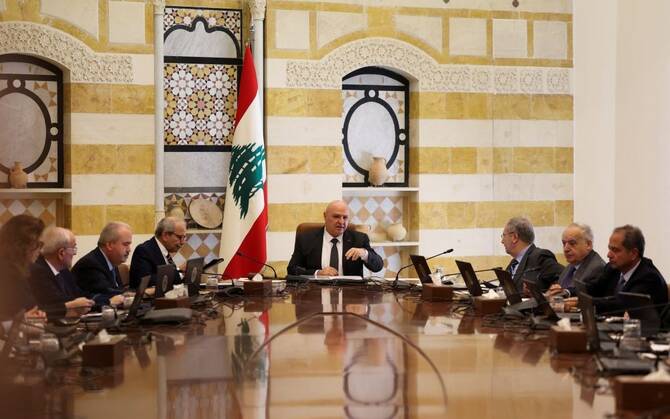BEIRUT: Lebanon’s President Joseph Aoun said that “the Lebanese army is carrying out its duties fully in southern Lebanon,” adding that “the state is committed to implementing Resolution 1701.”
He also announced that “Hezbollah is cooperative on the weapons issue,” noting that “dialogue is the key to solutions.”
His statements came on the eve of his expected visit to Paris and his participation in a summit with his French counterpart Emmanuel Macron.
In an interview with France 24, Aoun said that “the ceasefire agreement must be upheld by all parties,” noting that “Israel is the one violating this agreement by remaining in the five hills, while Lebanon seeks to preserve this agreement.”
He added: “Diplomatic calls are being carried out regarding this matter, and guarantees must come from France and the US, which are partners in the Quintet Committee tasked with monitoring the implementation of the agreement.”
Aoun affirmed Lebanon’s commitment to reforms,” adding that “we don’t have any other option.”
He said: “Reforms are more a Lebanese necessity than an international demand.”
Meanwhile, the Cabinet held a meeting at the Presidential Palace, chaired by Prime Minister Nawaf Salam, during which a new central bank governor was appointed.
The governor was chosen by voting rather than consensus, but Salam, the Sunni ministers in the government, and ministers Tarek Metri and Ghassan Salameh did not vote for the new governor.
The appointment of Karim Saeed came after a prolonged vacancy in the governorship, which resulted from the failure to elect a president for the republic for more than two years, alongside the arrest of the former central bank governor, Riad Salameh, on charges of embezzlement.
The new governor received 17 votes out of 24, following his responses to the ministers’ questions.
Saeed, 61, was included in a list of three names submitted by Finance Minister Yassine Jaber to the Cabinet, alongside Eddy Gemayel and Jamil Baz.
Saeed’s name is associated with what is known as the “Harvard Plan” for addressing the economic crisis in Lebanon, which was funded by Growthgate Capital.
Saeed is a founding partner and managing partner at Growthgate Equity Partners in the UAE, a firm specializing in alternative asset management that invests in private companies throughout the Middle East and North Africa. He previously held the position of general manager of Investment Banking Services at HSBC.
Additionally, he served as a board member at Emirates Lebanon Bank.
Meanwhile in southern Lebanon, Israeli military drones killed four people in less than 24 hours.
Lebanon’s Foreign Minister Youssef Rajji received a phone call from his Egyptian counterpart, Badr Abdel Ati. The two men discussed “Egypt’s efforts to curb Israel’s ongoing escalation in southern Lebanon, urging it to withdraw from the occupied Lebanese territories and adhere to the declaration of a ceasefire.”
Two guided missiles hit a car in Yohmor Al-Shaqif, resulting in three deaths, according to the Ministry of Health.
Israeli army spokesman Avichay Adraee claimed that the missile strikes targeted Hezbollah operatives who were reportedly transporting weapons.
The Ministry of Health also reported the death of another man, who was killed by an Israeli drone strike near Maaroub, Tyre.
The Israeli army claimed responsibility for killing “Ahmad Adnan Bajjiga, a battalion commander in Hezbollah’s Radwan Force, in the Derdghaiya area of southern Lebanon.”
Security reports indicate that Israel has resumed its attacks on Hezbollah in Lebanon, despite the ceasefire agreement between the two parties, which went into effect on Nov. 27, 2024.
These attacks have resulted in at least 105 deaths — comprising Hezbollah members, civilians and military personnel — and left around 300 others wounded.
The war, which Hezbollah launched in support of Gaza on Oct. 8, 2023, along with the subsequent ground war initiated by the Israeli army in Lebanon until the cessation of hostilities on Nov. 27, 2024, has killed 3,961 and injured 16,520, according to the Emergency Committee.




























